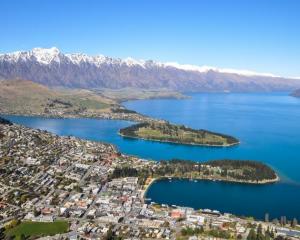The wardens respond to job advertisements in July each year and had a seven-day induction in Glenorchy two weeks ago.
Several are clocking up their third or fourth seasons.
The wardens hail from around the globe and range in age from their 20s to 50s.
The wardens manage Routeburn Flats, Routeburn Falls, Dart, Shelter Rock, Daleys Flat, Greenstone, McKellar, Mid Caples and Upper Caples huts.
They are paid, permanent part-time, seasonal employees of Doc Wakatipu, live in separate quarters adjacent to the hut for which they are responsible, and work two-weeks-on, one-week-off until the end of April.
Hut ranger John Dignan, of Dunedin, headed back for his fourth season this week.
"Each day I get the weather forecast from the Queenstown Regional Visitor Centre at 8.15am. It's like an on-air meeting of all the wardens.
"We call it the morning sched', and from that we relay back the hut numbers we had the previous nights, [sort out] tools or gear for the jobs we've got and request supplies.
"At 8.30am, I put the forecast on the whiteboard and that's eagerly awaited by the trampers, but regardless of the weather they have to walk, because there's another group of 48 people behind them."

He sweeps out bunkrooms, cleans toilets, maintains the hut and carries out track work where needed.
"I look after, basically, from the Routeburn Flats up to the Harris Saddle. It's about an hour and a-half's walk each side of my hut and at Harris Saddle there's a day hut with toilets and I look after that as well."
Wardens were usually back at their huts by 3pm or 4pm and, if the climate demanded it, would start the fire, much to the relief of trampers, Mr Dignan said.
"I give a hut talk at 7.30pm each evening. We talk about the weather, track safety and what they can expect to see on the track the next day.
"I go around and collect all the hut tickets and say hello to them and find out where they're from.
"I feel privileged to work not only in a beautiful environment, but to have a positive impact on their holiday."
Routeburn Track
- About 12,000 people stay in the huts on the Routeburn Track each summer season, averaging two nights each spread over the four different huts - Routeburn Falls, Routeburn Flats on the Wakatipu side of Harris Saddle, and McKenzie and Howden Huts on the Te Anau side.
- Approximately one-third of Routeburn trampers are New Zealanders.
- Revenue from the four Routeburn Track huts is split between the Wakatipu and Te Anau Department of Conservation offices and the national body, but it does not cover the full cost of maintaining the track, pumping sewage, the booking system, brochures, staff wages and other overheads.
- The track crosses 32km of Mt Aspiring and Fiordland National Parks, between the head of Lake Wakatipu and State Highway 94, the Te Anau-Milford road.
- A night in a hut costs $45 per adult and there is a maximum of two nights permitted during the peak Great Walks season, between October 28 and April 29. Bookings are required.
Advertisement













